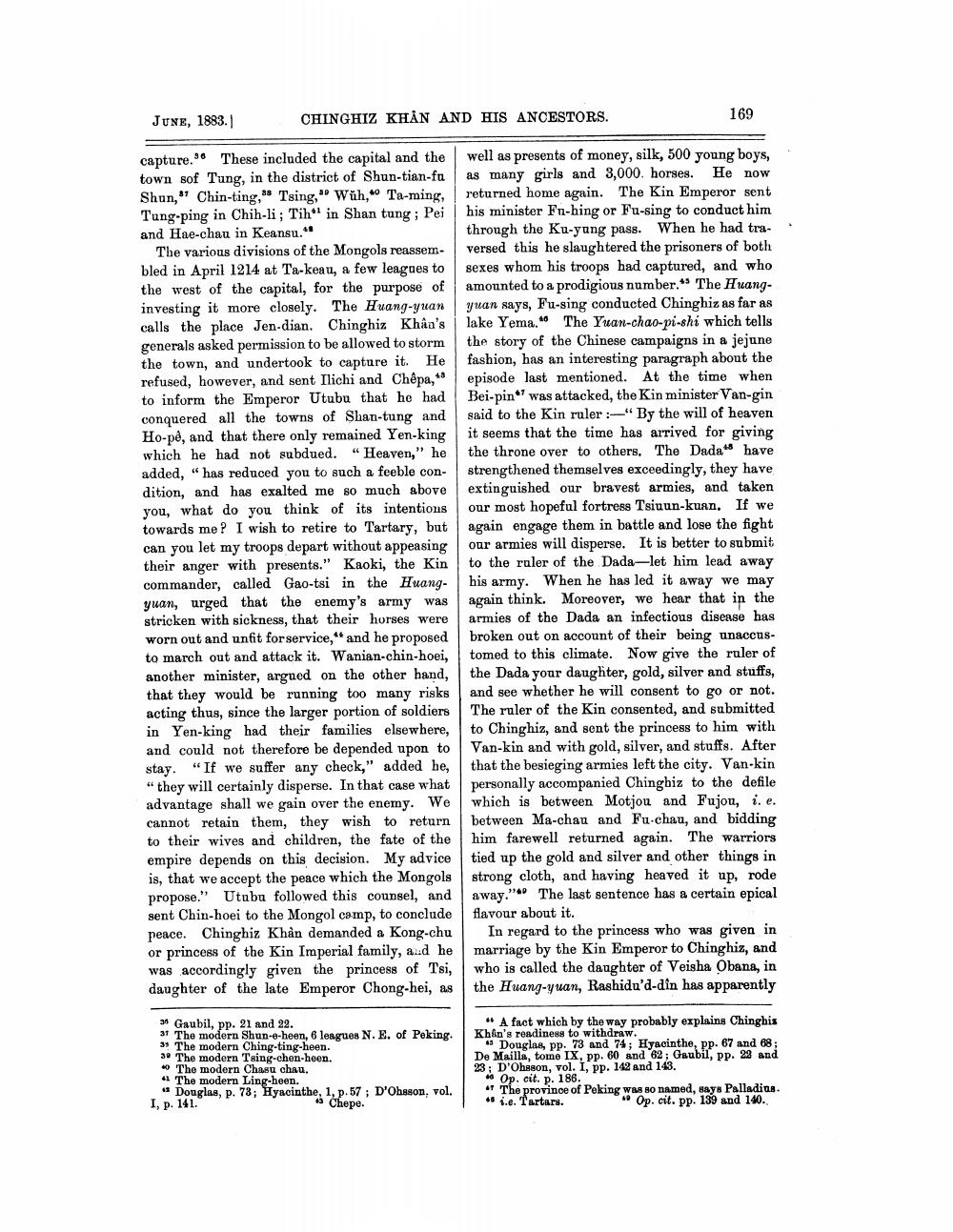________________
JUNE, 1883.1
capture. These included the capital and the town sof Tung, in the district of Shun-tian-fu Shun," Chin-ting, Tsing," Wüh, Ta-ming, Tung-ping in Chih-li; Tih" in Shan tung; Pei and Hae-chau in Keansu."
38
CHINGHIZ KHAN AND HIS ANCESTORS.
36
43
The various divisions of the Mongols reassembled in April 1214 at Ta-keau, a few leagues to the west of the capital, for the purpose of investing it more closely. The Huang-yuan calls the place Jen-dian. Chinghiz Khân's generals asked permission to be allowed to storm the town, and undertook to capture it. He refused, however, and sent Ilichi and Chêpa, to inform the Emperor Utubu that he had conquered all the towns of Shan-tung and Ho-pê, and that there only remained Yen-king which he had not subdued. "Heaven," he added, "has reduced you to such a feeble condition, and has exalted me so much above you, what do you think of its intentions towards me? I wish to retire to Tartary, but can you let my troops depart without appeasing their anger with presents." Kaoki, the Kin commander, called Gao-tsi in the Huangyuan, urged that the enemy's army was stricken with sickness, that their horses were worn out and unfit for service," and he proposed to march out and attack it. Wanian-chin-hoei, another minister, argued on the other hand, that they would be running too many risks acting thus, since the larger portion of soldiers in Yen-king had their families elsewhere, and could not therefore be depended upon to stay. "If we suffer any check," added he, "they will certainly disperse. In that case what advantage shall we gain over the enemy. We cannot retain them, they wish to return to their wives and children, the fate of the empire depends on this decision. My advice is, that we accept the peace which the Mongols propose." Utubu followed this counsel, and sent Chin-hoei to the Mongol camp, to conclude peace. Chinghiz Khan demanded a Kong-chu or princess of the Kin Imperial family, and he was accordingly given the princess of Tsi, daughter of the late Emperor Chong-hei, as
3 Gaubil, pp. 21 and 22.
37 The modern Shun-e-heen, 6 leagues N. E. of Peking.
35 The modern Ching-ting-heen.
39 The modern Tsing-chen-heen.
The modern Chasu chau.
The modern Ling-heen.
Douglas, p. 73; Hyacinthe, 1, p. 57; D'Ohsson, vol. I, p. 141.
Chepe.
169
well as presents of money, silk, 500 young boys, as many girls and 3,000. horses. He now returned home again. The Kin Emperor sent his minister Fn-hing or Fu-sing to conduct him through the Ku-yung pass. When he had traversed this he slaughtered the prisoners of both sexes whom his troops had captured, and who amounted to a prodigious number. The Huangyuan says, Fu-sing conducted Chinghiz as far as lake Yema. The Yuan-chao-pi-shi which tells the story of the Chinese campaigns in a jejune fashion, has an interesting paragraph about the episode last mentioned. At the time when Bei-pin was attacked, the Kin minister Van-gin said to the Kin ruler :-" By the will of heaven it seems that the time has arrived for giving the throne over to others. The Dada have strengthened themselves exceedingly, they have extinguished our bravest armies, and taken our most hopeful fortress Tsiuun-kuan. If we again engage them in battle and lose the fight our armies will disperse. It is better to submit to the ruler of the Dada-let him lead away his army. When he has led it away we may again think. Moreover, we hear that in the armies of the Dada an infectious disease has broken out on account of their being unaccustomed to this climate. Now give the ruler of the Dada your daughter, gold, silver and stuffs, and see whether he will consent to go or not. The ruler of the Kin consented, and submitted to Chinghiz, and sent the princess to him with Van-kin and with gold, silver, and stuffs. After that the besieging armies left the city. Van-kin personally accompanied Chinghiz to the defile which is between Motjou and Fujou, i. e. between Ma-chau and Fu-chau, and bidding him farewell returned again. The warriors tied up the gold and silver and other things in strong cloth, and having heaved it up, rode away." The last sentence has a certain epical flavour about it.
In regard to the princess who was given in marriage by the Kin Emperor to Chinghiz, and who is called the daughter of Veisha Obana, in the Huang-yuan, Rashidu'd-din has apparently
"A fact which by the way probably explains Chinghis Khân's readiness to withdraw.
5 Douglas, pp. 73 and 74; Hyacinthe, pp. 67 and 68; De Mailla, tome IX, pp. 60 and 62; Gaubil, pp. 22 and 23; D'Ohsson, vol. 1, pp. 142 and 143.
Op. cit. p. 186.
The province of Peking was so named, says Palladius. i.e. Tartars. Op. cit. pp. 139 and 140..
40




